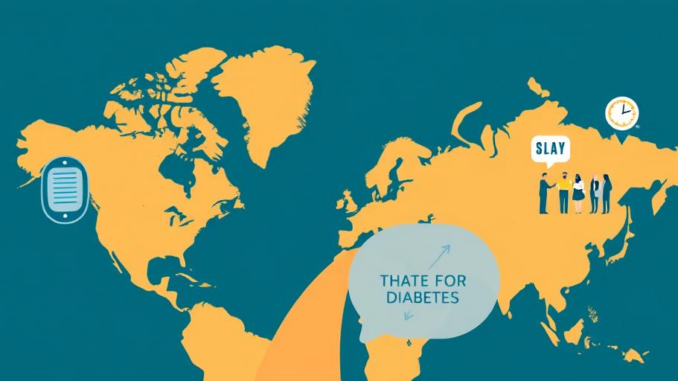
Summary
This article summarizes five key takeaways from the International Meeting on Type 1 Diabetes held in Copenhagen in February 2025. The meeting focused on advancing a global roadmap for improved and integrated care in low-resource settings. The takeaways emphasize the importance of data collection, patient empowerment, integrated care models, resource accessibility, and strong health systems through partnerships.
Start with a free consultation to discover how TrueNAS can transform your healthcare data management.
** Main Story**
Okay, so I wanted to share a few thoughts following the International Meeting on Type 1 Diabetes in Copenhagen. It was packed with over 100 international leaders, all focused on tackling the tough realities of managing type 1 diabetes, especially in countries where resources are tight.
Here’s my take on the five key areas that emerged, a sort of roadmap for making things better worldwide. Because let’s be honest, the current situation isn’t good enough.
1. Data is King (and Queen!)
Seriously, data collection and research are non-negotiable. Without solid data, you’re basically flying blind. We need better T1D registries to really understand how many people are affected, what the mortality rates look like, and the long-term impact on people’s lives. This isn’t just about numbers; it’s about understanding the real-world burden of this disease and directing resources where they matter most.
In many low-resource settings, T1D goes undiagnosed, untreated, and unfortunately, un-researched. It’s a vicious cycle. More robust data collection efforts are really needed.
Plus, better data helps us make smarter decisions, avoid wasting time and effort, and encourages collaboration for care that’s sustainable and truly focused on the patient.
2. Empowering Patients: They’re the Experts
This one’s crucial. People living with T1D need to be active participants in their own care. I’ve seen this firsthand. My cousin was diagnosed a few years back, and the difference between when she felt helpless and when she started taking charge of her management was night and day.
Shared decision-making, patient education, and strong support networks are all essential for improving how well people stick to their treatment plans and their overall health. You have to arm patients with the knowledge and resources to manage their condition confidently and navigate the daily challenges.
3. Integrated Care: Seeing the Whole Picture
We’re talking comprehensive and coordinated care, here. It can’t just be about the medical stuff; the mental and emotional aspects of living with T1D are equally important. Healthcare professionals, patients, and families all need to be on the same page, working together to provide care that’s truly patient-centered.
And this is especially important in places with limited resources, like humanitarian settings, where access to specialized care might be scarce. Integrated care bridges those gaps.
4. Access and Affordability: No One Left Behind
Everyone deserves access to the essentials: insulin, monitoring devices, education. No question. But affordability… that’s where things get tricky, especially in those low- and middle-income countries. The cost of insulin is still a huge hurdle for too many people.
If we’re serious about improving T1D care globally, then addressing affordability is a must. We need to bring down those costs and prevent unnecessary complications.
5. Partnerships: Strength in Numbers
This is where collaboration comes in. Governments, healthcare providers, researchers, patient advocacy groups – everyone needs to be working together. Partnerships are the engine that drives knowledge sharing, resource mobilization, and capacity building.
The Copenhagen meeting itself was a testament to this, showcasing the amazing things that can happen when people collaborate, particularly in low- and middle-income countries. Remember; together we are stronger.
Looking Ahead: The Future of T1D Management
The field is moving fast. We’re seeing exciting breakthroughs in insulin delivery systems, like artificial pancreas technology. And there’s progress on immunotherapies that could potentially delay or even prevent T1D altogether. Think about that for a second.
Ongoing research is also exploring stem cell therapies, gene editing, and islet cell transplantation – all potential game-changers for restoring insulin production and even curing T1D one day.
In Conclusion…
The International Meeting on Type 1 Diabetes was a critical step toward tackling the global challenges of this disease. The five takeaways? A solid roadmap for better care, particularly where resources are scarce. But we can’t stop here.
Continued research, collaboration, and advocacy are key to turning these ideas into real improvements in the lives of people living with T1D worldwide. And as new treatments emerge, I think it’s fair to say there’s a growing sense of hope for a future where T1D is no longer the burden it is today.


The emphasis on patient empowerment is inspiring. How can we best leverage technology, such as telehealth and personalized apps, to facilitate shared decision-making and provide accessible education for individuals managing T1D, especially in underserved communities?
That’s a fantastic point! Telehealth and personalized apps hold immense potential. Beyond accessibility, I think user-friendly design and multilingual support are crucial to ensure these technologies truly empower individuals in underserved communities to actively participate in their T1D management. What innovative features could bridge the digital divide?
Editor: MedTechNews.Uk
Thank you to our Sponsor Esdebe
The call for integrated care models resonates strongly. Successfully implementing these models requires a holistic approach, including culturally sensitive training for healthcare providers to address the unique needs of diverse T1D populations.
I’m so glad the focus on integrated care resonated! You’re spot on about the need for culturally sensitive training. Considering the varying cultural beliefs around health and wellness, how can we best tailor these training programs to ensure they are both effective and respectful?
Editor: MedTechNews.Uk
Thank you to our Sponsor Esdebe
Data *is* king (and queen!), but let’s not forget its mischievous court jester: human error. Even the shiniest T1D registry is only as good as the accuracy of the entered information. Maybe we need to gamify data entry with leaderboard prizes for the most diligent recorders?